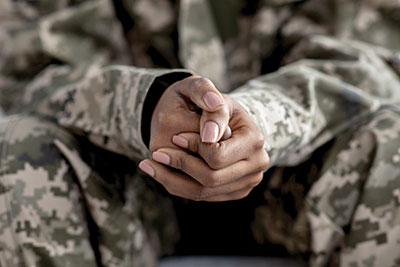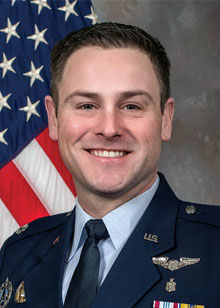APA Resource Document on Psychiatry and Military Service Provides Guidance to Civilian Psychiatrists
Abstract
The resource document highlights critical elements of military mental health standards in a question-and-answer format on issues that civilian psychiatrists may not be aware of.

The APA Resource Document on Psychiatry and Military Service is now available for civilian psychiatrists treating active-duty military personnel as a guide to the unique and sometimes sensitive diagnostic and treatment issues that may be involved in caring for these individuals.
The 11-page document was approved by APA’s Joint Reference Committee in February. (Resource documents do not require approval by the Board of Trustees.) It was reviewed by the psychiatry consultants to the surgeon general of three branches of the U.S. Military: Air Force Lt. Col. Eric Meyer, M.D., Ph.D., Army Col. Sebastian Schnellbacher, D.O., and Navy Cmdr. Monica Ormeno, D.O.
The document was also approved by the Defense Health Agency (DHA) and TRICARE. (DHA is responsible for health care delivery in the Department of Defense, and TRICARE is responsible for all contracts paying for health care outside of the department.)
Additional contributions were made by members of the Society of Uniformed Services Psychiatrists (SUSP), APA’s military district branch; Glenda Wrenn, M.D, M.S.H.P., of the Council on Quality Care; and Harold Kudler, M.D., of the APA Caucus of V.A. Psychiatrists. The issues outlined in the document refer only to active-duty personnel, Reserve, and National Guard members of the military.

Lt. Col. Eric Meyer, M.D., Ph.D., an Air Force psychiatrist, said many civilians may not be aware of the implications of military mental health standards when caring for patients. “There are rules that dictate what is safe in the military,” he said.
The resource document will introduce civilian psychiatrists to what amounts to a unique and highly specialized community in which, for instance, even the right to confidentiality is not absolute. “Some aspects of the military are shared with other high-performance professions, … but many other aspects are unique and occur only within military service,” the document states. “For example, in order to ensure accommodations for mental and physical impairment, there are times when disclosure of limited protected health information is important and allowed by law to protect the well-being of the service member, other military members, or the military mission. Further, the military has physical and mental health standards that must be met to join the military, remain in the military, do specific jobs in the military, and deploy to potentially austere environments.”
The resource document is arranged under seven broad category statements, each followed by a series of questions and answers. These are the seven categories:
As a civilian psychiatrist, it is important to know whether your patient is in the military.
It is important that civilian psychiatrists share documentation with their military patient’s referring military clinician.
Civilian clinicians receiving TRICARE payment should notify the referring military clinician or a proxy at a military treatment facility in a timely manner when their military patients have evidence of serious risk to self, others, or their military mission.
Any mental health diagnosis or treatment has the potential to impact a military member’s career.
Neurodevelopmental and personality disorders have the potential to end a military member’s career.
Bipolar- and psychotic-related diagnoses will likely end a military member’s career.
The use of antipsychotics, mood stabilizers (anticonvulsants for psychiatric indications), or lithium is likely to end a military member’s career.
The seven category statements and their questions and answers are followed by another set of commonly asked general questions.
Meyer, who is deputy director of psychological health for the Department of the Air Force, told Psychiatric News the document is the product of an Assembly Action Paper approved in 2022 and designed to improve the awareness of all APA members regarding military implications of psychiatric diagnoses and treatments. “It is a guide to an underrepresented and poorly understood minority,” he said. Meyer is also a professor of psychiatry at the Uniformed Services University in Bethesda, Md.
In 2021 Meyer ran for the Assembly as a representative from SUSP, with the explicit intention of bringing the issue of caring for military members to the APA administration. Working with Heather Hauck, M.D., a member of SUSP and now Area 5 trustee, Meyer shepherded an action paper supporting creation of the resource document through the assembly.
“When I was president of the SUSP, one of the issues that came up was that civilian psychiatrists really don’t know the implications of military medical standards,” he said. “The differences are not just cultural—there are legal issues involved and rules that dictate what is safe in the military.”

Glenda Wrenn, M.D., M.S.H.P., said familiarity with military medical standards is a matter of cultural competence and equity.
As the document states: “As a result of military physical and mental health standards, a diagnosis or treatment can impact a military member’s career, their family, their mission—and their identity.”
The resource document also highlights the Military Culture Course Modules, a series of training videos by the Uniformed Services University on the core competencies for clinicians working with service members.
Wrenn, who reviewed the resource document as a member of the APA Council on Quality Care, said that as a veteran who has fielded questions from service members about seeking mental health care in civilian sectors and as a civilian psychiatrist working in and outside the V.A., she knew how important a guide for civilian psychiatrists is. As she reviewed the first draft of the document, she knew that the language needed to be “civilian-ized”—terms needed to be clarified and the seven statement categories had to be broken into questions and answers.
“We needed to think the way civilian psychiatrists think and elevate questions that they may not necessarily ask themselves, but that would help them digest key policies to which their patients or future patients are subject.”
She is chief of clinical strategy at Mindoula Health in Silver Spring, Md.
Wrenn said familiarity with military standards on the part of civilian psychiatrists is a matter of cultural competence and equity. “This document is critical to ensuring that civilian psychiatrists don’t unwittingly cause harm to the active-duty personnel they are treating because these service members are part of a specialty profession for which our diagnoses and treatments can have serious consequences,” she told Psychiatric News. ■



